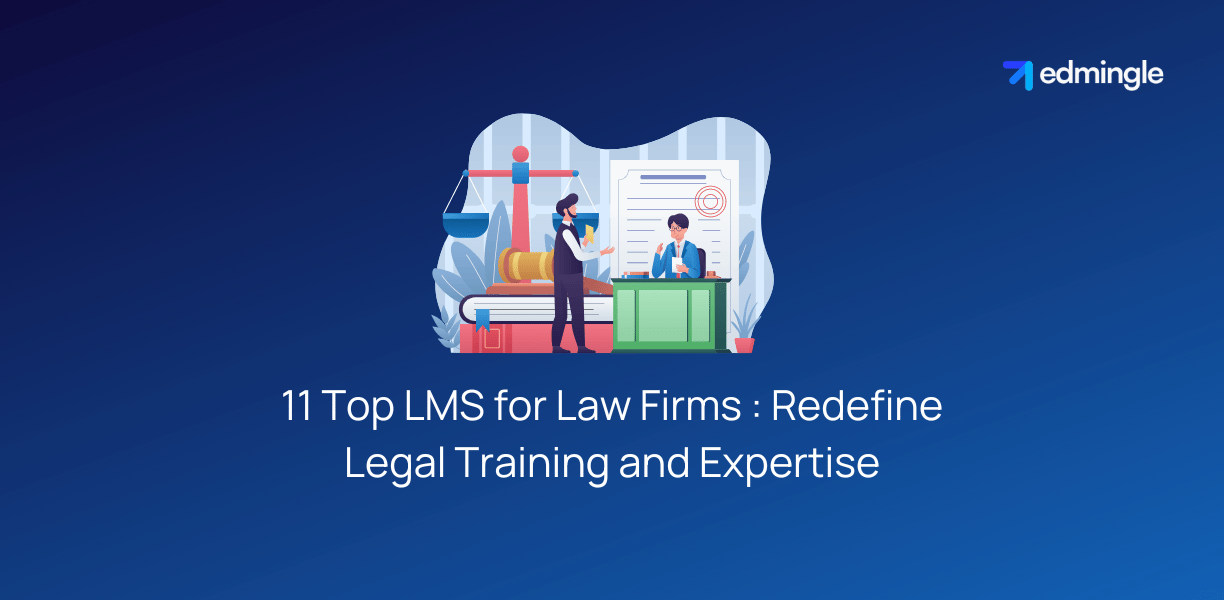
Today, legal precedents evolve at the speed of light. And, continuous skill enhancement is not just an option for law firms; its a necessity.
In such a scenario, an LMS for law firms offers a dynamic & efficient platform for legal professionals to stay ahead of the curve.
If you’re part of a law firm looking to elevate your training methodologies, you’ve landed on the right page.
In this blog, we’ll guide you through the maze of learning management systems for the legal industry.
So, buckle up as we embark on this journey, with a keen eye on features, usability, and how they can be the game-changer in your legal training programs.
How is an LMS for Law Firms Different?
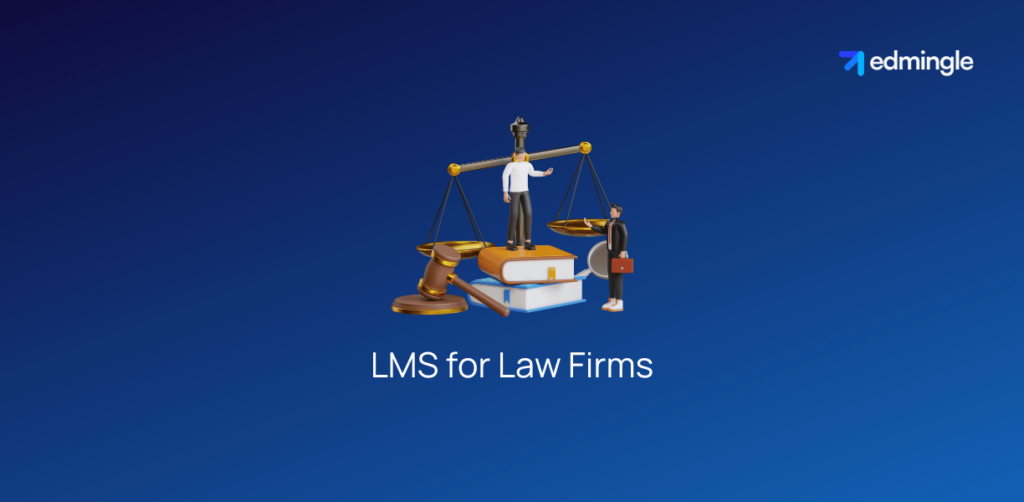
An LMS for law firms is a specialized digital platform designed to facilitate and enhance the learning and training processes within the legal sector.
Tailored to meet the specific needs of law professionals, this type of LMS offers a range of tools and resources that support continuous learning, development, and compliance training.
It enables law firms to create, manage, and deliver educational content and training modules relevant to legal practice.
Furthermore, it helps law firms seeking to maintain high standards of legal expertise, keep updated with ever-evolving legal market & ensure their team is equipped with the latest knowledge and skills.
What is an LMS Used for in the Legal Industry?
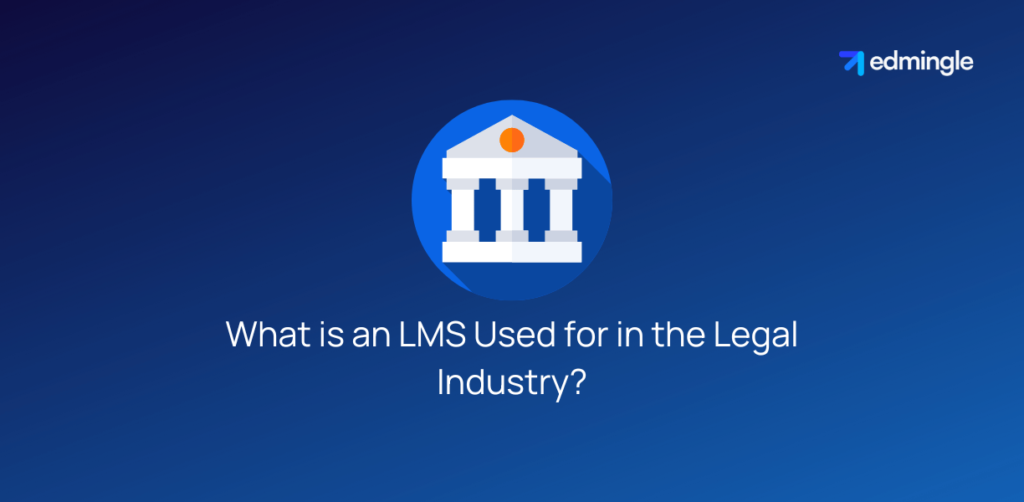
In the legal industry, a learning management system is used as a dynamic tool to streamline and enhance the learning and professional development processes within law firms and legal departments.
- It serves as a centralized platform for delivering, tracking, and managing training and educational content tailored to legal professionals. This includes a wide array of learning materials such as online courses, live webinars, compliance training, and continuing legal education (CLE) programs.
- An LMS in the legal sector facilitates the up-to-date training of lawyers and legal staff on new laws, regulations, and legal practices, ensuring compliance with legal standards and enhancing overall law firm expertise.
- Additionally, it provides reports and analytical features to monitor progress and performance, thereby assisting law firms in identifying knowledge gaps and training needs, fostering a culture of continuous learning and professional growth.
10 Step Guide on How to Use an LMS to Train Legal Professionals
Using a learning management system to train legal professionals involves a strategic approach that leverages the LMS’s capabilities to meet the unique needs of the legal service sector.
Here’s a guide on how to use an LMS for delivering effective training to legal professionals:
| Step 1. Identify Training Needs: Start by assessing the specific training requirements of your legal team. This could include understanding new laws, mastering legal software, developing soft skills, or adhering to compliance and ethics standards. |
| Step 2. Select Appropriate Content: Choose or create content that aligns with these needs. This can range from online courses and webinars to interactive simulations and case studies relevant to legal practice. Ensure the content is engaging, up-to-date, and practical. |
| “If you’re unsure about how to create an online course, our blog might help.” |
| Step 3. Customize Learning Paths: Tailor learning paths for different roles within the law firm. For instance, attorneys may require advanced legal courses, while administrative staff might need training in legal software or office procedures. |
| Step 4. Integrate Interactive Learning: Incorporate interactive elements like quizzes, discussion forums, and scenario-based learning to enhance engagement and knowledge retention. |
| Step 5. Leverage Mobile Learning: Utilize the LMS’s mobile learning capabilities to allow legal professionals to access training materials anytime, anywhere, catering to their busy schedules. |
| Step 6. Track and Assess Progress: Use the LMS’s tracking and reporting tools to monitor the learner/law firm employee progress. Regular assessments, quizzes, and feedback can help gauge understanding and identify areas needing further attention. |
| Step 7. Offer Continuing Legal Education (CLE): If your LMS is accredited, offer CLE courses to help lawyers meet their mandatory education requirements. |
| Step 8. Encourage Collaboration and Peer Learning: Facilitate forums or groups within the LMS where members of the legal profession can share insights, discuss cases, and learn from each other’s experiences. |
| Step 9. Regularly Update Content: The legal field is constantly evolving. Regularly update your training materials to reflect the latest laws, regulations, and best practices. |
| Step 10. Gather Feedback and Iterate: Feedback is key to effective e-learning. Collect feedback from users to understand what is working and what needs improvement. Use this feedback to make ongoing adjustments to your training program. |
By following these steps, an LMS can become a powerful tool in a law firm’s arsenal. Not only to keep legal professionals informed and compliant but also to aid their continuous learning and professional development.
10 Key Features of an LMS for Law Firms

Law firms are increasingly turning to learning management systems (LMSs) to stay ahead of the curve.
An LMS designed for law firms is more than just a training tool; it’s a comprehensive platform that revolutionizes how legal knowledge is disseminated, absorbed, and applied.
Let’s explore the standout features of an LMS that make it an indispensable asset for any law firm aiming to foster a culture of continuous learning and professional excellence.
1. Customizable Learning Paths: Tailoring training to individual roles and experience levels is crucial in law. A top-tier LMS offers customizable learning paths, ensuring that from paralegals to senior attorneys, each team member receives relevant, role-specific training.
2. Up-to-Date Legal Content: The legal field is dynamic, with frequent updates in laws and regulations. An effective LMS for law firms continuously updates its content repository with the latest legal developments, case studies, and compliance guidelines.
3. Interactive Learning Modules: Engaging learning experiences are vital for knowledge retention. Modern LMS platforms incorporate interactive elements like simulations, quizzes, and scenario-based learning, making complex legal concepts more digestible and engaging.
4. Mobile Learning Capabilities: Recognizing the busy schedules of legal professionals, a law-focused LMS provides mobile access to learning materials, allowing attorneys to learn on-the-go and at their convenience.
5. Compliance Tracking and Reporting: With stringent compliance requirements in the legal industry, an LMS offers robust tracking and reporting features. These tools help law firms ensure that their staff are not only compliant with industry standards but are also making progress in their learning journeys.
6. Continuing Legal Education (CLE): Many LMS platforms for law firms are equipped to offer CLE credits. This feature is invaluable for attorneys looking to fulfill their professional development requirements seamlessly.
7. Collaborative Tools and Forums: Law is as much about individual learning as it is about collaborative problem-solving. An LMS for law firms often includes forums for social learning and collaborative tools where legal professionals can share insights and discuss complex legal scenarios.
8. Performance Analytics: To continually improve training effectiveness, these systems provide detailed analytics on user performance, helping identify knowledge gaps and areas for further training.
9. Scalability and Integration: As law firms grow, their LMS should grow with them. The best LMS platforms offer scalability and can integrate smoothly with existing systems and software used by the firm.
10. Secure and Confidential: Understanding the sensitive nature of legal information, an LMS for law firms prioritizes data security and confidentiality, ensuring that all training materials and user information are protected.
In summary an LMS for law firms is a multifaceted platform that not only streamlines legal training but also enriches the professional growth of legal practitioners.
And by leveraging these features, law firms can cultivate a knowledgeable, compliant, and efficient workforce, ready to tackle the legal challenges of today and tomorrow.
Benefits of an LMS for the Legal Industry
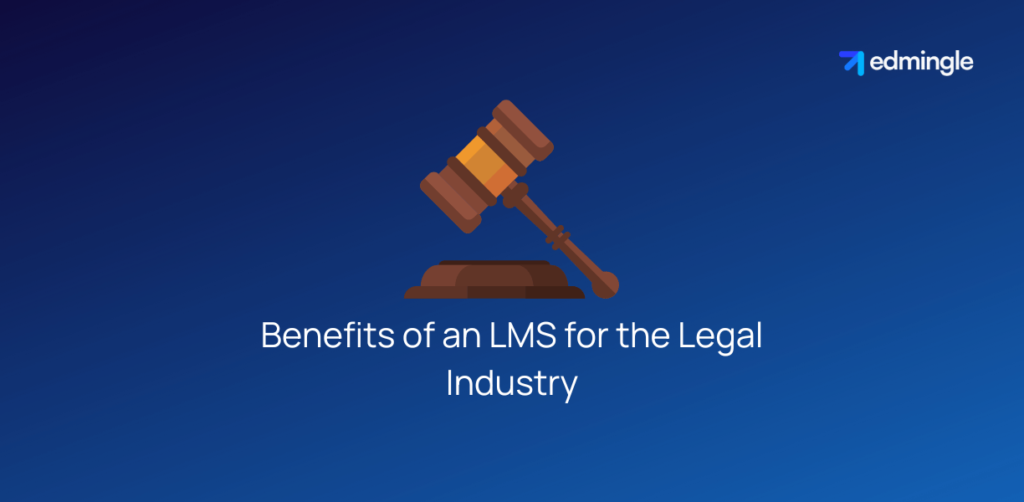
The implementation of an LMS in the legal industry brings a multitude of benefits, streamlining the process of training and knowledge management within law firms and legal departments.
Firstly, an LMS offers centralized access to up-to-date legal content and resources. This ensures that legal professionals stay informed about the latest laws, regulations, and case precedents, crucial for effective practice and compliance.
Secondly, the customizable nature of an LMS allows for the creation of tailored learning paths.
These paths address the specific educational needs and skill levels of various roles within the legal sector, from junior lawyers to senior partners. This targeted approach enhances learning efficiency and effectiveness.
Moreover, the flexibility of an LMS supports on-demand and mobile learning, catering to the busy schedules of legal professionals.
This accessibility enables continuous learning without disrupting their work commitments. The interactive and engaging learning modules, often part of an LMS, improve knowledge retention and make complex legal concepts more understandable.
An LMS also facilitates tracking and assessment of learning progress. Legal firms can monitor compliance with mandatory Continuing Legal Education (CLE) requirements and identify areas for further training.
This feature aids in maintaining high professional standards and ensuring competency across the firm.
Not to forget, an LMS reduces training costs significantly while reducing training efforts & streamlining the entire training process.
Additionally, LMS platforms encourage a collaborative learning environment. They often include features like forums and group discussions, promoting peer-to-peer learning and knowledge sharing.
This collaborative aspect is vital for nurturing a learning culture within the organization.
An LMS enhances learning efficiency, ensures compliance, fosters continuous professional development, and cultivates a collaborative environment in the legal industry.
Learning Management System vs. Legal Management System
While both systems share the acronym ‘LMS’, they cater to different needs within a professional setting.
A Learning Management System is a tool for educational endeavors, facilitating learning and knowledge sharing.
In contrast, a Legal Management System is a comprehensive solution for managing the intricacies and workflows specific to the legal industry.
Here’s a comparison table that breaks down the key differences:
| Aspect | Learning Management System (LMS) | Legal Management System (LMS) |
|---|---|---|
| Primary Function | Designed to create, manage, and deliver educational content and training programs. | Focuses on managing legal cases, client information, and law firm administrative tasks. |
| Target Users | Used by organizations across various industries for employee training and development. | Specifically designed for legal firms, legal departments, and legal professionals. |
| Key Features | Course creation and management Enrollment and tracking of learners’ progress Assessment and feedback tools Certification and compliance tracking | Case management and tracking Client relationship management Legal document storage and management Billing and time tracking |
| Benefits | Enhances learning and professional development Facilitates compliance training Offers flexibility and accessibility in learning Provides analytics for tracking progress | Streamlines case management processes Improves client management and communication Enhances document organization and accessibility Facilitates accurate billing and time management |
| Usage Scenario | Ideal for training programs, skill development, and compliance education across various sectors. | Best suited for managing legal workflows, client interactions, and internal administrative tasks in a legal environment. |
And ultimately, determining which ‘LMS’ is right for your organization depends on your primary needs.
11 Best LMS for Law Firms in 2023
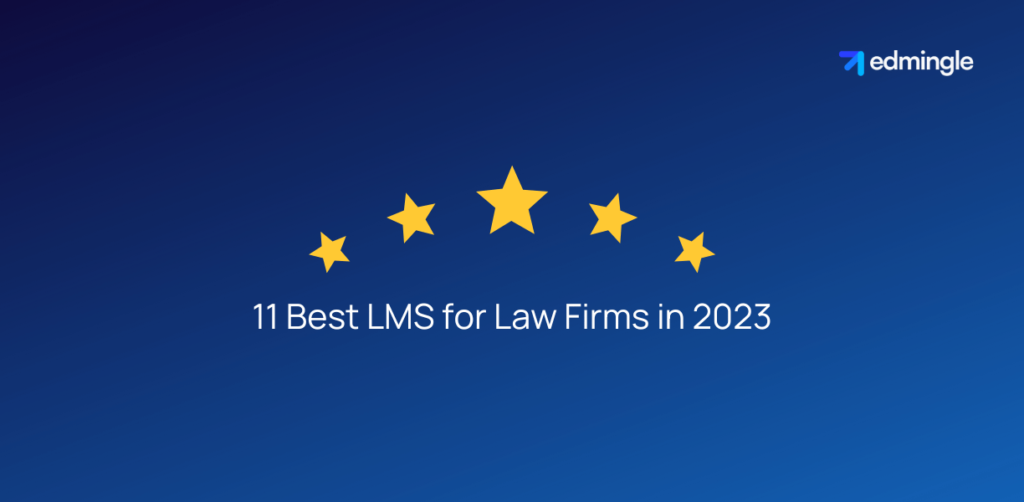
Legal training and professional development can be a complex task. That’s where learning management systems come into play.
And with the technological advancements of 2023, there are a plethora of options. Let’s dive in to know about the 11 best platforms.
1. Edmingle
Edmingle stands out with its user-friendly interface, exceptional approach to customer support & service and scalable & flexible nature. Additionally, it comes loaded with a wide range of useful features.
It’s an ideal choice for law firms looking to create custom training modules. Its robust analytics tools help in tracking learner progress, making it a top pick for firms focused on measurable results.
The cherry on the cake? It’s rated #1 in the list of Best LMSs of 2023 by SoftwareSuggest.
2. Intellek
Intellek is celebrated for its interactive content and engaging learning experiences. It offers a wide range of customizable courses specifically designed for legal professionals, ensuring that content remains relevant and up-to-date with the latest legal trends.
3. BeaconLive
BeaconLive shines in live training and webinars. This platform is perfect for law firms that prioritize real-time learning and interactive sessions. It also offers excellent support for Continuing Legal Education (CLE), a must-have for legal practitioners.
4. Litmos
Litmos is known for its scalability and flexibility, making it a great fit for both small and large law firms. Its extensive library of online courses and mobile-friendly design ensures learning is accessible anytime, anywhere.
5. SkyPrep
SkyPrep excels in user experience and ease of use. It provides law firms with a straightforward approach to course creation and management, combined with powerful reporting tools for tracking training effectiveness.
6. Trakstar
Trakstar offers a unique blend of learning management and performance management. This dual approach helps law firms align their training programs with performance goals, ensuring a more strategic approach to professional development.
7. SavvyAcademy
SavvyAcademy is tailored specifically for the legal industry, offering specialized courses and content. It stands out for its focus on practical skills and law firm-specific functionalities, making it a highly relevant choice for legal training.
8. Paradiso
Paradiso is notable for its customization capabilities and integration with other software. It offers a versatile platform that can adapt to the specific needs of a law firm, ensuring a seamless training experience.
9. Accord LMS
Accord LMS is appreciated for its robust features and user-friendly interface. It provides comprehensive tools for course creation, learner engagement, and progress tracking, suitable for law firms of all sizes.
10. Profiscience
Profiscience makes its mark with a strong emphasis on interactive learning and professional development. Its platform is designed to cater to the continuous learning needs of legal professionals, making it a strong contender in the market.
11. LMS365
LMS365 stands out for its integration with Microsoft 365, offering a familiar environment for many users. This feature-rich platform simplifies learning management processes and enhances collaboration and accessibility within law firms.
Ultimately, the selection of an LMS for a law firm should be a strategic decision. Take into account the firm’s specific training needs, size, and the desired outcomes from the learning initiatives.
Conclusion
As we wrap up our comprehensive exploration it’s clear that the integration of these dynamic platforms into the legal sector marks a significant shift.
One that is directed towards a more efficient, accessible, and engaging approach to professional development.
By embracing these digital solutions, law firms can ensure their team is equipped with the latest knowledge and skills, thereby enhancing their service quality and maintaining their edge in the legal field.
FAQs on LMS for Law Firms
What are the ways in which an LMS helps with legal compliance training?
Following are the ways in which an LMS helps with legal compliance training:
-Automated Updates
-Tracking and Reporting
-Interactive Learning
-Assessment Tools
Is an LMS for law firms compliant with legal regulations?
Compliance of LMS for law firms with legal regulations are of two types.
1)Industry Standards: Most LMS platforms for law firms are designed to comply with industry-specific legal standards, including data protection and privacy laws.
2)Accreditation for CLE: Many LMS platforms are accredited to provide Continuing Legal Education (CLE) courses, adhering to the legal industry’s educational standards.
Can an LMS for law firms be customized for specific needs?
Yes an LMS for law firms can be customized for specific needs. The major customizations needed for such application consist of tailored learning paths & content integration. Here, content integration allows for the integration of firm-specific content, including case studies, internal procedures, and proprietary legal materials.
How does an LMS handle sensitive and confidential information?
An LMS efficiently handles sensitive and confidential information in the following ways:
1)Data Encryption: LMS platforms use encryption and secure servers to protect sensitive information.
2)Access Controls: They implement strict access controls and user permissions to ensure that confidential information is only accessible to authorized personnel.
3)Compliance with Data Protection Laws: LMS providers ensure compliance with data protection laws like GDPR, safeguarding personal and sensitive information.
What type of support do law firms require while implementing an LMS?
The type of support required by law firms while implementing an LMS may differ from firm-to-firm. However, the 4 main types are technical support, training for the LMS platform, customization assistance & ongoing support for their operations.






Leave a Reply